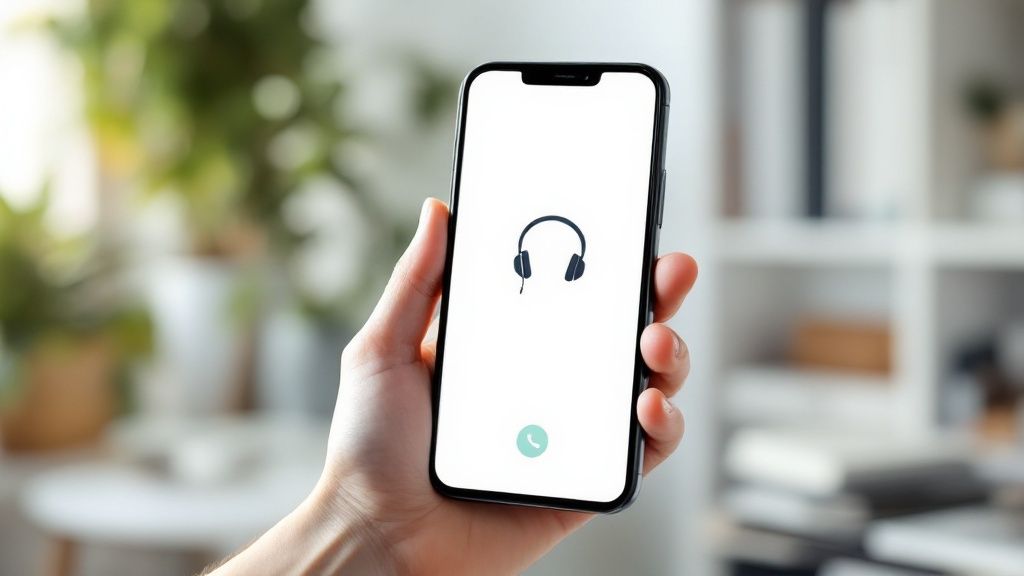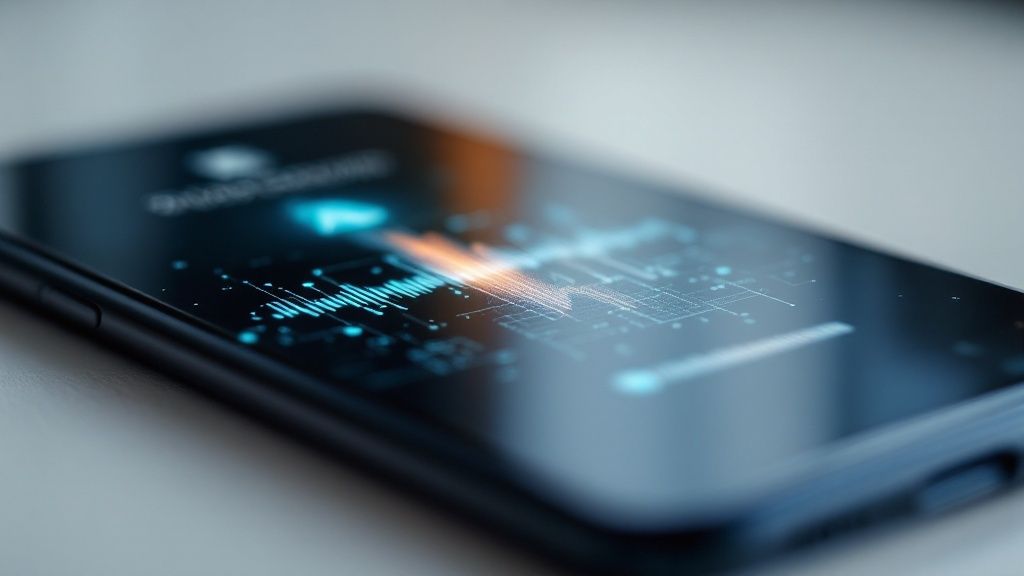So, what exactly is an AI phone receptionist? It’s a sophisticated system that leverages artificial intelligence to answer calls, schedule patient appointments, and handle common inquiries automatically. Think of it as a new digital team member for your practice—one that works tirelessly, 24/7, to manage incoming calls so your human staff can dedicate their full attention to the patients right in front of them. This technology is not a futuristic concept; it's a practical tool that modern healthcare practices are adopting to enhance operational efficiency and improve patient care.
What an AI Phone Receptionist Means for Healthcare

Imagine a front desk that never misses a call, even late at night, on weekends, or during a busy holiday season. Patients could book appointments, get answers to basic questions, or request prescription refills without ever hearing a busy signal or being put on hold. This is precisely the operational reality that an AI phone receptionist makes possible for a modern healthcare practice. It's about creating an accessible, responsive, and patient-centric communication channel that meets the demands of today's connected world.
This isn't just a high-tech answering machine or a simple voicemail system. It's a real operational tool meticulously built to solve some of the most persistent front-desk challenges, such as long patient wait times, call abandonment, and staff feeling overwhelmed by the sheer volume of administrative tasks. The technology uses sophisticated voice recognition and natural language processing (NLP) to understand what a patient needs and respond in a helpful, natural, and empathetic way. Because it's specifically trained for a clinical setting, it can easily handle a high volume of concurrent calls, ensuring every patient is attended to promptly.
Beyond a Simple Answering Service
A traditional answering service merely takes a message for someone to deal with later, often creating delays in patient care and adding to the administrative backlog. An AI assistant, on the other hand, gets the job done right away. It is designed to plug directly into your practice management software and Electronic Health Record (EHR) systems, acting as a genuine, intelligent extension of your administrative team.
This direct integration is the key differentiator that allows it to perform tasks that make a real, tangible difference. For example, a patient could call at 10 PM on a Friday needing to reschedule a specialist appointment. The AI doesn't just pass along a message; it accesses the doctor's live schedule, identifies an open slot that fits the patient's request, books the new appointment, and immediately sends a confirmation text or email. The entire interaction happens instantly and accurately, without anyone on your staff having to lift a finger. You can see more on how an AI front desk solution can modernize day-to-day operations and create a more streamlined workflow.
An AI receptionist transforms the telephone from a source of constant interruption into an automated, efficient tool for patient engagement and operational management. It works tirelessly so your human team can focus on providing exceptional in-person care.
The Foundation in AI Technology
To truly appreciate what an AI phone receptionist can do, it helps to understand its place within the broader world of Artificial Intelligence in Healthcare. This tool is a practical, real-world application of advanced AI built for a very specific and high-impact purpose: optimizing the front-desk operations of medical practices.
Here’s what makes it so valuable in a clinical environment:
- 24/7 Availability: Patients can always get through to book an appointment or ask a question, which dramatically improves their access to care and overall satisfaction. This constant availability caters to individuals with non-traditional work schedules and urgent, non-emergency needs.
- Immediate Response: Every single call is answered on the first ring. This completely gets rid of the frustrating hold times that often cause patients to give up, potentially leading them to call another practice instead.
- Task Automation: It takes over the repetitive but critically necessary jobs like sending appointment reminders, managing cancellations, and handling prescription refill requests. This frees up your team’s time and energy for more complex, high-value tasks that require a human touch.
At the end of the day, an AI phone receptionist is about building a practice that is more efficient, responsive, and friendly for both patients and staff. It’s an investment in a better operational model that benefits everyone involved.
What to Look for in an AI Receptionist for Your Medical Practice

Choosing an AI phone receptionist for a medical practice isn't like picking one for any other type of business. When patient health and sensitive data are on the line, standard off-the-shelf features just don't cut it. You need a system that has been built from the ground up with the unique demands of healthcare in mind—one that prioritizes security, accuracy, and seamless integration above all else.
Let's be clear: not all AI tools are created equal. A generic system might be able to answer calls and route them, but it won’t understand the specific language, workflows, and compliance requirements of a busy clinic. The right tool, however, moves far beyond basic call forwarding and becomes a core, integrated part of your team, making sure every patient interaction is handled with the utmost care, confidentiality, and precision.
HIPAA-Compliant Communication
First things first, security is everything. Any technology you bring into your practice that handles patient information absolutely must be fully HIPAA compliant. This is the one feature where there is zero room for compromise. A breach of patient data can lead to severe legal penalties, financial repercussions, and irreparable damage to your practice's reputation.
This means all patient communications—every call, every message, every piece of data exchanged—are encrypted and protected according to strict federal standards. A reputable AI provider will always sign a Business Associate Agreement (BAA), which is a legally binding contract that holds them accountable for safeguarding Protected Health Information (PHI). This essential agreement protects both your patients and your practice from serious liability.
Intelligent, Context-Aware Scheduling
In a healthcare setting, booking an appointment is far more than just finding an open slot on the calendar. A truly effective AI receptionist needs to understand the subtle complexities of a medical schedule and the varying needs of different patients. It must be able to handle nuanced requests with intelligence.
This is what advanced, context-aware scheduling looks like in action:
- It Recognizes Appointment Types: The system can tell the difference between a new patient consultation (which might require a longer time slot and specific paperwork), a routine follow-up, a telehealth visit, or an urgent same-day request, and block out the appropriate amount of time for each one.
- It Manages Complex Doctor Schedules: The AI is programmed to know which doctors are available, what specific procedures they perform, their unique hours, and even which clinic locations they work from on different days. This prevents double-bookings or scheduling errors.
- It Verifies Insurance Information: You can even program the AI to ask for basic insurance details upfront during the call, giving your administrative staff a valuable head start on verifying coverage and preparing for the patient’s visit.
Seamless EHR Integration
A standalone AI system that doesn't talk to your other critical software just creates more work and silos of information. The single most important feature for operational efficiency is its ability to integrate directly and seamlessly with your Electronic Health Record (EHR) and Practice Management (PM) software.
This integration is a complete game-changer. It means the AI isn't just taking messages; it's actively and automatically updating patient records in real time. When a new patient books an appointment, the AI can create a new patient file directly in the EHR, which slashes manual data entry and minimizes the risk of human error.
Adopting an AI phone receptionist can deliver some pretty immediate and significant financial returns. Businesses have reported cost reductions between 27% and 90%, with first-year returns on investment soaring from 300% to as high as 1,775%. This remarkable ROI is possible because the AI works 24/7 without breaks and handles all the routine tasks that used to tie up your valuable staff members. You can explore more statistics about the financial impact of AI receptionists to see just how quickly these systems can pay for themselves and start generating positive returns.
To put it all into perspective, let's look at a quick comparison of how an AI-powered system stacks up against the old-school phone setup that so many practices still rely on.
AI Receptionist vs. Traditional Phone System for Healthcare
The differences become starkly clear when you see the capabilities side-by-side. An AI system is designed to automate, integrate, and streamline, while a traditional system relies entirely on the manual effort and limited availability of your staff.
| Feature | AI Phone Receptionist | Traditional Phone System |
|---|---|---|
| Availability | 24/7/365, including holidays | Business hours only |
| Call Capacity | Handles dozens of calls at once | One call per line |
| EHR Integration | Automatically updates patient records | Requires manual data entry |
| Patient Intake | Automates new patient forms and data collection | Manual paperwork at the clinic |
| Appointment Reminders | Sends automated texts and calls | Relies on manual calls by staff |
| Cost Efficiency | Low, fixed monthly cost for unlimited work | High cost of salaried staff time |
| Data Analytics | Provides insights on call volume and trends | No data tracking capabilities |
Ultimately, the goal of implementing an AI receptionist is to free up your talented team to focus on what they do best: providing excellent, compassionate patient care. The AI handles the administrative load, ensuring the front desk runs smoothly and efficiently, even during the busiest hours of the day.
Improving the Patient and Staff Experience

Putting an AI phone receptionist to work in your practice is about more than just boosting efficiency and cutting costs. It creates a positive ripple effect that completely changes the daily experience for both your patients and your front-desk staff. The benefits often show up almost immediately, turning what was once a point of friction—the constantly ringing phone—into a source of genuine relief and improved service.
For patients, the biggest and most immediate win is access. Gone are the days of playing phone tag with the clinic, sitting on hold listening to repetitive music, or scrambling to call during a narrow window of business hours. After all, healthcare needs don't follow a neat 9-to-5 schedule, and your practice’s front door shouldn't either.
A New Level of Patient Convenience
Think about a parent with a sick child late at night. Instead of waiting anxiously until the clinic opens the next morning, they can call at 10 PM, interact with the AI assistant, and instantly book the first available appointment slot for the following day. This 24/7 availability offers incredible peace of mind and demonstrates that you’re truly committed to patient-first care.
This kind of around-the-clock service fundamentally improves and strengthens the patient relationship. It knocks down the common barriers to getting an appointment and makes every person who calls feel heard and helped, right when they need it most. It communicates that your practice values their time and is accessible on their terms.
By eliminating wait times and offering constant availability, an AI receptionist ensures that a patient's first interaction with your practice is positive, efficient, and reassuring. This sets a professional and caring tone for their entire care journey.
While an AI handles the initial contact, you can dig even deeper into patient satisfaction to continuously refine your services. Using dedicated tools like healthcare survey software allows you to gather direct, actionable feedback and make continuous improvements based on what your patients are actually telling you about their experience.
Empowering Your Front Desk Staff
The change for your staff is just as significant and transformative. Your front desk team is the heart and soul of your practice, but they're often buried under a mountain of repetitive, low-value phone calls. An AI receptionist acts as a powerful and intelligent filter, handling the constant stream of routine inquiries that eat up their day and prevent them from focusing on more critical tasks.
This immediately frees them up from time-consuming tasks like:
- Appointment Confirmations: The AI can manage all appointment reminders and confirmations via automated calls or texts, which dramatically cuts down on no-shows without anyone having to manually pick up the phone.
- Basic Inquiries: Simple but frequent questions about office hours, directions, parking, or accepted insurance plans get answered instantly by the AI, saving staff countless hours each week.
- Insurance Queries: The system can even field initial insurance questions, collecting the necessary information before a staff member ever needs to step in, making the entire process more efficient.
By taking this immense weight off their shoulders, your team can finally focus on the human side of healthcare. They have the time and mental space to give their full attention to the patient standing in front of them, tackle a complex billing issue with care and empathy, or provide the kind of compassionate support that only a person can offer.
This isn't just about reducing burnout, although that is a major benefit. It's about elevating their role from that of call operators to true patient care coordinators, which increases job satisfaction and reduces costly staff turnover.
How to Implement an AI Receptionist in Your Practice

Bringing an AI phone receptionist into your practice is much easier and more straightforward than you might think. These days, the technology is designed to be user-friendly and is built for busy clinics, not massive corporate IT departments. Let’s walk through a simple, practical roadmap that takes you from initial planning to a successful launch, ensuring a smooth transition for your team and patients.
It all starts with getting a clear handle on what your practice really needs. Take a close look at your daily routines, call logs, and front-desk workflows to pinpoint where the biggest communication headaches and bottlenecks are. This isn’t just about installing a piece of software; it’s about strategically implementing a solution to fix real, persistent problems for your staff and your patients.
Assess Your Practice Needs
Before you even start looking at different AI tools or vendors, you need a clear picture of what you want to achieve. The first and most critical step is to gather some baseline data to understand your starting point. This information will be your guide when you start comparing providers and making sure the solution you choose fits your clinic like a glove.
To get started, ask yourself a few key questions:
- What is your average daily call volume? Knowing this helps you pick a plan that won't buckle during your busiest times and ensures you have the capacity you need.
- What are the most common reasons patients call? Are they mostly scheduling appointments, asking for refills, inquiring about bills, or getting directions? Identifying these top reasons tells you exactly what tasks to hand over to the AI first for the biggest impact.
- Which EHR or PM software do you use? For any modern healthcare practice, smooth, bidirectional integration with your existing systems is a non-negotiable must-have. You need an AI that plays well with the tools you already rely on every day.
Doing this homework upfront ensures you end up with an AI receptionist that solves your actual problems from the get-go and delivers a rapid return on investment. For a deeper dive into this crucial planning stage, check out our comprehensive guide on how to implement AI voice agents.
Choose the Right Provider
Once you have a clear understanding of what you need, it's time to find a provider that lives and breathes healthcare. The market for virtual receptionists and AI assistants is booming, with the industry projected to hit around $25 billion by 2025. But while there are plenty of generic options available, only a handful are truly built for the rigorous security and compliance standards that a medical practice demands.
When you're picking a partner, make sure they offer a Business Associate Agreement (BAA) and have real, demonstrable experience with healthcare clients. This is your assurance that they understand how critical protecting patient data is and can deliver a genuinely HIPAA-compliant service.
Look for a provider that doesn't just check off your technical boxes but also offers fantastic, hands-on support. A great partner will sit down with you to map out call flows, train the AI on the unique details and nuances of your practice, and get your team fully trained and ready for the new system. This kind of collaboration is what turns a good tool into a great, indispensable one.
Calculating the Return on Your Investment
Bringing an AI phone receptionist into your practice isn't just another operational expense. It's crucial to think of it as a strategic investment in your practice's efficiency, growth, and overall financial health. To see the real value, you have to look past the monthly subscription fee and connect the dots to the tangible, measurable results it delivers across your entire operation.
The best way to do that is by tracking the right numbers—the key performance indicators (KPIs) that prove the system is paying for itself, and then some. These metrics will clearly illustrate the financial impact and justify the investment to stakeholders.
Key Financial Metrics to Track
The financial wins from an AI system are easy to spot if you know where to look. You can start by focusing on just a few high-impact areas where this kind of intelligent automation makes an immediate and significant difference.
Here are the most important KPIs to keep an eye on:
- Reduction in Staff Overtime: Tally up the hours your team used to spend on the phone after hours, during their lunch breaks, or catching up on calls from the previous day. An AI assistant works 24/7, completely eliminating this recurring cost.
- Decrease in Patient No-Show Rates: Smart, automated appointment reminders are simply more effective and consistent than manual calls. Dropping your no-show rate from 15% down to 5% can put thousands of dollars in recovered revenue back into your practice every single month.
- Increase in New Appointments: How many new patients book their first visit after your staff has all gone home for the day? Every appointment scheduled at 9 PM on a weeknight or on a Saturday morning is new revenue you would have otherwise missed out on entirely.
Calculating Your Direct ROI
Figuring out the basic return on your investment doesn't have to be complicated. A simple framework can give you a quick, clear picture of how fast the AI system pays for itself. For a deeper dive into this calculation, we have a whole article dedicated to showing how practices can effectively measure the ROI of AI voice agents in healthcare.
This shift toward automation is happening everywhere, not just in healthcare. By 2025, some estimates suggest that nearly 85% of all customer interactions across all industries will be handled without a human agent. It's a massive technological trend, and it's why the AI virtual receptionist market is on track to hit $9 billion by 2033. The numbers don't lie—the return is real, and early adopters stand to gain the most. You can find more insights on the future of AI receptionists on myaifrontdesk.com.
The Invaluable Soft ROI
Beyond what you can track on a spreadsheet, an AI receptionist delivers a powerful "soft ROI." These are the benefits that are just as critical to the long-term success of your practice but a bit harder to pin to a specific dollar amount.
An AI phone receptionist creates a more stable, positive, and sustainable work environment. By removing the primary source of front-desk stress—the constantly ringing phone—it allows your staff to provide better, more focused, and more compassionate care to the patients right in front of them.
This change alone leads to a huge boost in staff morale and job satisfaction, which means less burnout and lower employee turnover—both of which are incredibly expensive and disruptive problems for any practice. At the same time, when patients have a smoother, more convenient, and more professional experience, their satisfaction goes up. That translates directly into better online reviews, more positive word-of-mouth referrals, and a stronger reputation in your community for the long haul.
Answering Your Questions About AI in Healthcare
Thinking about bringing new technology into your practice naturally comes with a host of questions. It's a big decision, and you, your team, and your patients need to feel completely comfortable and confident. Let's clear up some of the most common concerns right away so you can make an informed choice.
We want you to feel completely prepared and confident that this is the right move for your practice, armed with the facts to address any potential hesitation from staff or patients.
Can an AI Handle Complex Medical Questions?
No, and it's intentionally designed that way for safety and compliance. A well-built AI receptionist for a healthcare setting is strictly limited to performing administrative tasks. Think of it as a highly trained specialist in scheduling, answering questions about office hours, providing directions, and routing calls appropriately.
The moment a patient starts describing symptoms, asks for medical advice, or mentions an emergency, the system is programmed to do one thing: immediately and seamlessly escalate the call to a nurse, doctor, or another qualified human. This hard boundary is a crucial safety feature, ensuring that medical guidance always comes from a licensed professional.
Is This Technology Secure and HIPAA Compliant?
Absolutely. For any AI solution to even be considered for a healthcare environment, security has to be its foundational backbone. Reputable providers build their platforms from the ground up with HIPAA compliance in mind, because protecting sensitive patient data is completely non-negotiable.
They will always provide a signed Business Associate Agreement (BAA) and use robust, end-to-end encryption for every single interaction. This means all Protected Health Information (PHI) is kept completely secure, keeping your practice compliant with federal regulations and your patients' privacy fully intact. It's like having a digital Fort Knox for your communications.
Will This Technology Replace My Front Desk Staff?
Not at all. The primary goal is to empower your staff, not replace them. It's about augmenting their capabilities and making their jobs more manageable and rewarding.
An AI receptionist takes over the repetitive, high-volume, and often monotonous calls that lead to burnout and distraction. This frees up your valuable human team to focus on what only humans can do: provide excellent, empathetic, in-person patient care.
Your staff can finally give their full, undivided attention to the patients checking in at the desk, manage complex billing issues with care, and handle urgent situations without the constant interruption of a ringing phone. It elevates their role from simple call operators to true patient care coordinators, a position that is more fulfilling and more valuable to the practice.
What Happens if a Patient Gets Frustrated?
Every good system is designed with a "human escape hatch." Modern conversational AI can understand not just words, but also the tone of voice. It is trained to pick up on signs of frustration, confusion, or agitation in a caller's voice.
If a caller gets upset, speaks in an urgent tone, or simply says, "I need to talk to a person," the AI is designed to instantly and smoothly transfer the call to a human staff member. This critical feature guarantees that no patient ever feels stuck, ignored, or trapped in a frustrating automated loop. Compassionate, human help is always just a sentence away.
Ready to see how an AI-powered voice assistant can transform your practice? Simbie AI offers a clinically-trained solution that handles administrative tasks 24/7, so your team can focus on delivering exceptional patient care. Discover how Simbie AI can reduce costs and improve efficiency for your clinic.

